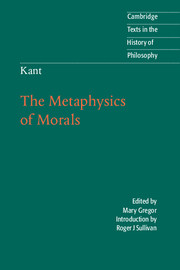Part II - Metaphysical first principles of the doctrine of virtue
Summary
Preface
A philosophy of any subject (a system of rational knowledge from concepts) requires a system of pure rational concepts independent of any conditions of intuition, that is, a metaphysics. – The only question is whether every practical philosophy, as a doctrine of duties, and so too the doctrine of virtue (ethics), also needs metaphysical first principles, so that it can be set forth as a genuine science (systematically) and not merely as an aggregate of precepts sought out one by one (fragmentarily). – No one will doubt that the pure doctrine of right needs metaphysical first principles; for it has to do only with the formal condition of choice that is to be limited in external relations in accordance with laws of freedom, without regard for any end (the matter of choice). Here the doctrine of duties is, accordingly, a mere scientific doctrine (doctrina scientiae).
But in this philosophy (the doctrine of virtue) it seems directly contrary to the idea of it to go all the way back to metaphysical first principles, so as to make the concept of duty, though purified of anything empirical (any feeling), the incentive. For what sort of concept can be made of the force and herculean strength needed to subdue the vice-breeding inclinations if virtue is to borrow its weapons from the arsenal of metaphysics, a speculative subject that few know how to handle? Hence all doctrine of virtue, in lecture halls, from pulpits, or in popular books, also becomes ridiculous if it is decked out in scraps of metaphysics.
Information
- Type
- Chapter
- Information
- Kant: The Metaphysics of Morals , pp. 139 - 170Publisher: Cambridge University PressPrint publication year: 1996
Accessibility standard: Unknown
- 2
- Cited by
